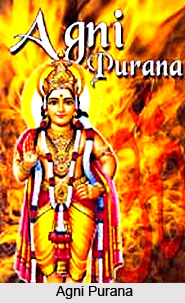 Concept of Dhyana in Agni Purana has been given by Lord agni. Lord Agni in Agni Purana has stated that Dhyanam denotes the state of mind, in which the mind, at first making use of an artificial or imaginary concept, as its stay or support, and making itself believe that it has really found a tangible category to rest on, ultimately loses the notion of its imaginary character, believes it to be real, and does not wait for further proof of its concepts actual existence there and at that time. Such a conviction and the consequent merging of the mind in the thing meditated upon, as real and self-existing objectively are called Dhyanam or Meditation.
Concept of Dhyana in Agni Purana has been given by Lord agni. Lord Agni in Agni Purana has stated that Dhyanam denotes the state of mind, in which the mind, at first making use of an artificial or imaginary concept, as its stay or support, and making itself believe that it has really found a tangible category to rest on, ultimately loses the notion of its imaginary character, believes it to be real, and does not wait for further proof of its concepts actual existence there and at that time. Such a conviction and the consequent merging of the mind in the thing meditated upon, as real and self-existing objectively are called Dhyanam or Meditation.
It has been said in the Purana that the man, who departs this life in such a state of mind, is sure to succour the souls of his friends, relation and cognates and ultimately becomes one with the divine essence of the god `Hari`. The merit of thus constantly and devoutly meditating upon the self of Vishnu far exceeds the collective fruits of the performance of all the great sacrifices.
Therefore, a man of wisdom and true philosophy should first learn all about the nature of meditation, meditated and the thing meditated upon, and then devote his whole soul to the practice of Yoga. From the practice, of Yoga results the liberation of one`s own Self, and the acquisition of those miraculous powers, which are known as the Aishvaryayam.
Since meditation leads to the acquisition of superhuman powers and to the ultimate emancipation of the Self, and since Lord Vishnu always rewards such meditations with the fruition of their initiative purposes, therefore waking or asleep, moving or at rest it is advised that one should carry on the process of meditation.
According to the Purana the sacrifice of meditation (Dhyana-Yajna) is the greatest of all religious sacrifices, and, as such, incapable of all blemishes. By meditation alone, men can be free, free from life and its fetters, and not by vows, and penances, nor by performance of sacrifices and cleansing of the body. Meditation leads to the entire cessation of all evil propensities of the mind, such as envy, malice, etc., and is therefore the only real purifier. The rite of meditation (Dhyan-Yajna) is the greatest of all rites. It opens to the Meditator the gates of heaven. The Meditator should abstract his mind from such like thoughts, and fix it upon what is pure, perfect and eternal.
It has been said that the Meditator should repeat the holy Pranava-Mantra, while thus engaged in meditating upon the Absolute in his heart. These gross or sensuous concepts should be looked upon as mere makeshifts, assumed only for the permanent concentration of the mind. When that is attained, they vanish of their own accord, and the mind remains riveted to the thought or idea and suffers no distraction.
Finally Agni Purana states that Lord Vishnu is pleased with the person, who dedicates himself to meditation and repetition of the Mantra.



















